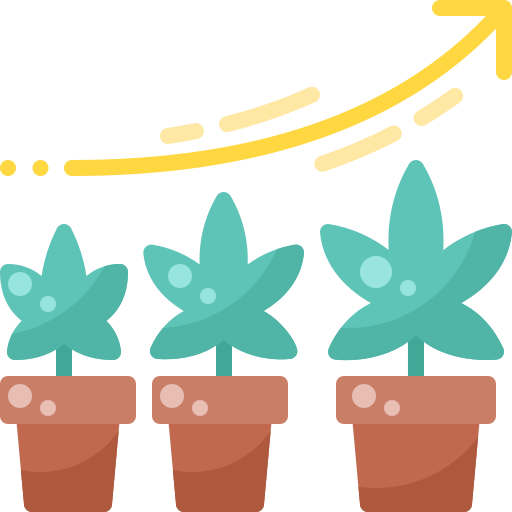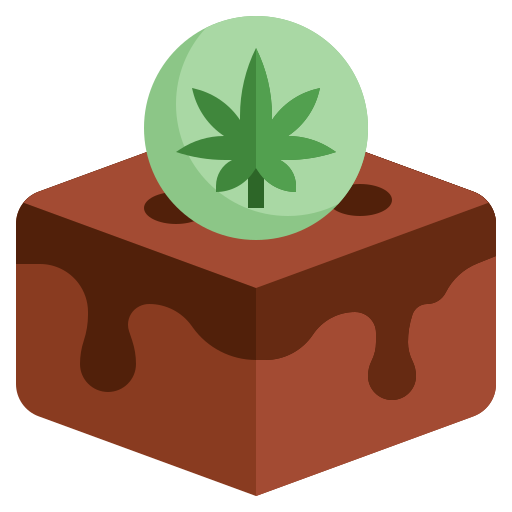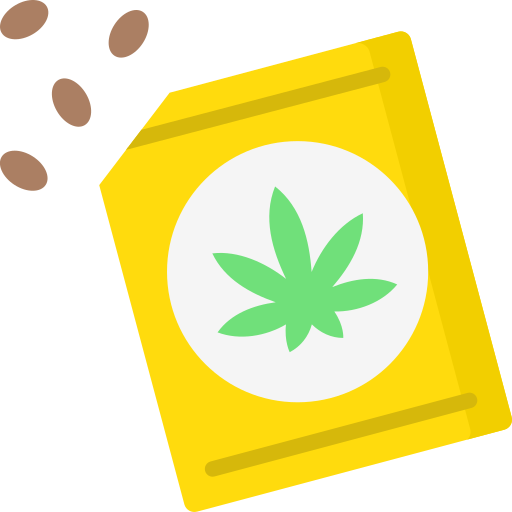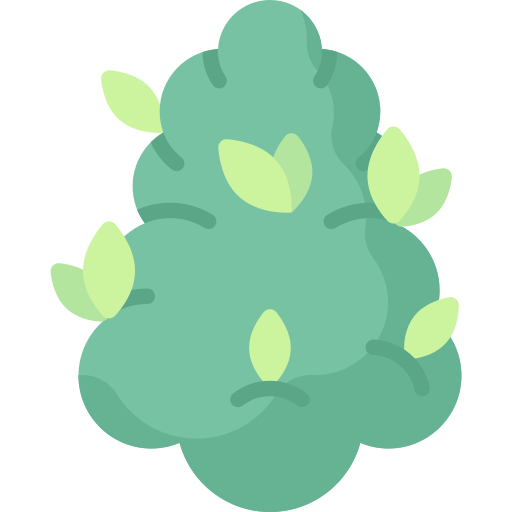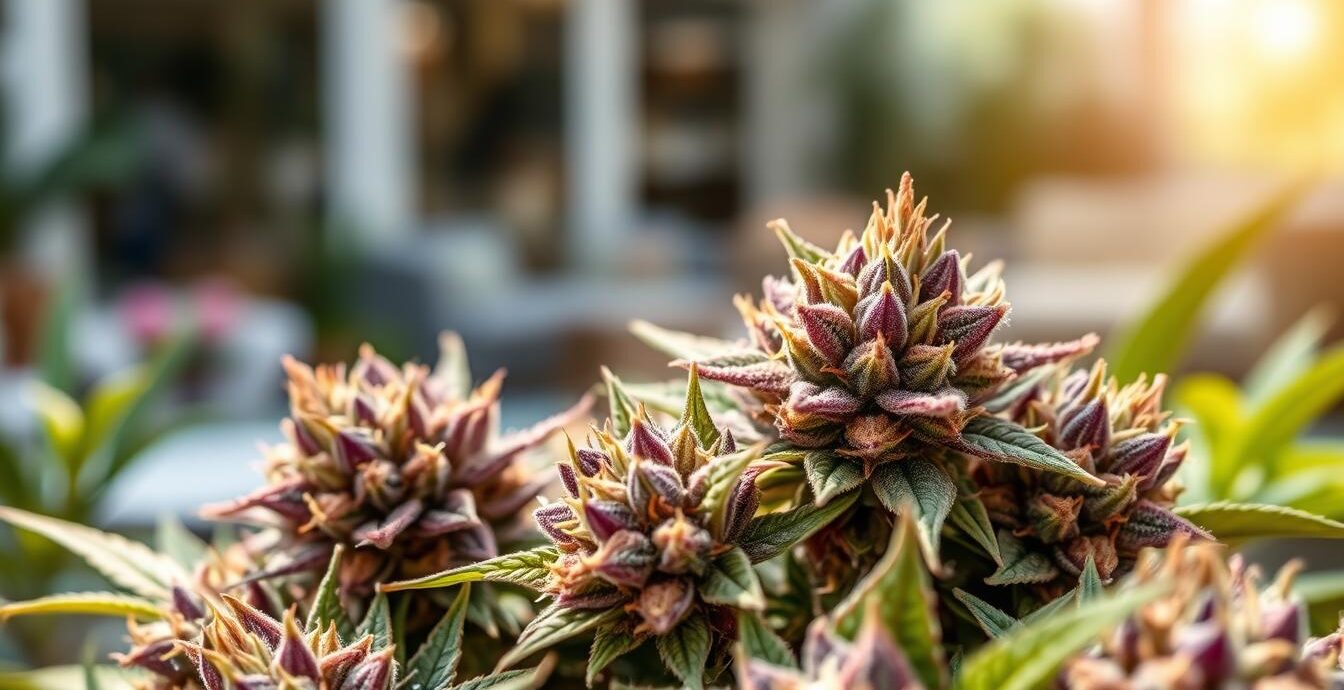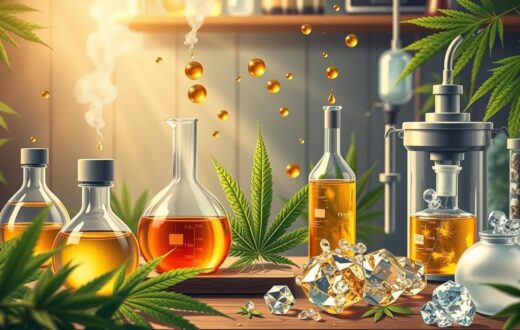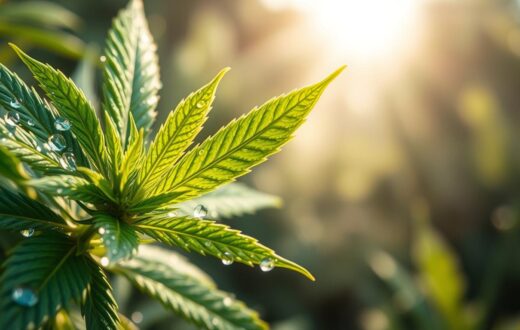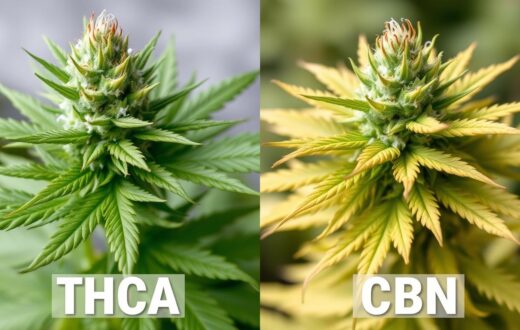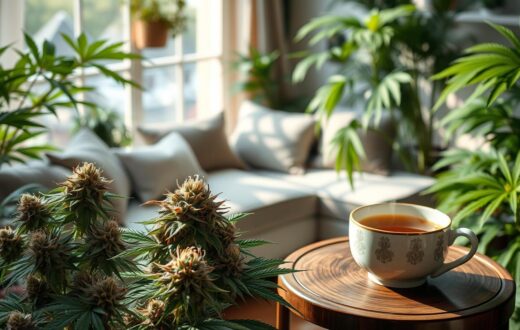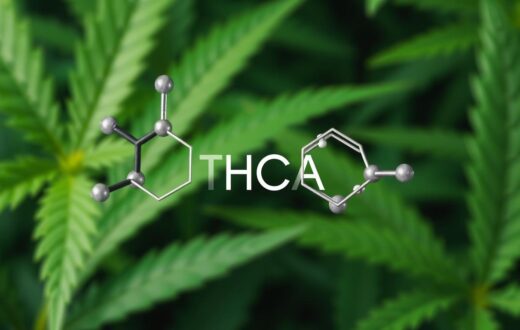Ever wondered about the buzz surrounding THCA flower? This raw cannabis component is making waves in the wellness world. But what exactly sets it apart from its famous cousin, THC? Let’s dive into the fascinating world of THCA and uncover its potential effects and benefits.
THCA, short for tetrahydrocannabinolic acid, is a non-psychoactive cannabinoid found abundantly in raw cannabis plants. Unlike THC, THCA won’t get you high – at least not until it’s heated. This unique characteristic has piqued the interest of researchers and consumers alike, sparking a surge in studies exploring THCA benefits.
From potentially reducing inflammation to offering neuroprotective properties, THCA is showing promise in various therapeutic areas. As we delve deeper into the effects of THCA flower, we’ll explore how this cannabinoid interacts with our body’s endocannabinoid system. We’ll see why it’s becoming a go-to option for those seeking natural wellness solutions.
Ready to unravel the mysteries of THCA? Buckle up as we explore the science, effects, and potential benefits of this intriguing cannabinoid. Whether you’re a cannabis enthusiast or simply curious about alternative health options, this journey through the world of THCA flower effects promises to be eye-opening.
What is THCA Flower?
THCA flower is a cannabis product rich in tetrahydrocannabinolic acid (THCA). It’s found in fresh cannabis plants, especially in raw buds. This product has become popular for its unique benefits.
Definition and Overview
THCA flower is cannabis buds with lots of THCA. Unlike THC, it doesn’t make you feel high when raw. It’s legal in many places where THC isn’t, as long as it has less than 0.3% THC.
Chemical Composition
The main part of THCA flower is the THCA cannabinoid. It has a similar structure to THC but with an extra group. This group changes how it affects the body. THCA flower also has other cannabinoids and terpenes, adding to its profile.
How It Differs from THC
THCA and THC have different effects. THC makes you feel high, but THCA doesn’t when raw. But, when THCA is heated, it turns into THC. This change, called decarboxylation, makes it psychoactive. Knowing this is key for those wanting THCA’s benefits without the high.
Understanding the Endocannabinoid System
The endocannabinoid system is crucial for our body’s balance. It’s a complex network of receptors and chemicals. These help regulate many important functions. Let’s see how cannabinoids like THCA interact with it and why it’s important for our health.
Role of Cannabinoids
Cannabinoids work with our endocannabinoid system. Some are made by our bodies, others from plants like cannabis. They help control mood, appetite, and pain. The system uses these chemicals to keep our bodies running smoothly.
Interaction with THCA
THCA is found in raw cannabis plants. It doesn’t make you feel high like THC does. But THCA still interacts with our endocannabinoid system in unique ways. It doesn’t bind directly to cannabinoid receptors like THC does.
Instead, THCA may work through other pathways to produce effects. This thca interaction could explain some of its potential health benefits.
Importance in Overall Health
A healthy endocannabinoid system is vital for wellbeing. It helps manage stress, sleep, inflammation, and more. By working with this system, cannabinoids like THCA might support our bodies in staying balanced.
While we’re still learning about THCA, early research suggests it could have promising effects on health when used responsibly.
Common Effects of THCA Flower
THCA flower gives users a special experience without the usual high. It’s the raw form of the plant with THCA, a non-psychoactive compound. This compound turns into THC when heated. Let’s look at the effects and benefits of THCA flower.
Mild Psychoactive Effects
Unlike THC, THCA doesn’t cause strong psychoactive effects. Users say they feel subtle changes in perception and get more alert. But they don’t feel drunk. This makes THCA flower great for those who want to stay sharp while enjoying cannabis.
Potential Therapeutic Benefits
The benefits of THCA are catching the eye of medical experts. Studies show it might have anti-inflammatory and neuroprotective effects. Some people find it helps with nausea and pain. These benefits make it a promising natural remedy.
Mood Enhancement and Relaxation
Many users feel calm and relaxed after using THCA flower. It improves mood without the strong high THC gives. THCA flower can make you feel good and enhance physical sensations, helping with stress and relaxation.
Remember, THCA flower should be eaten raw or used cold to keep its benefits. Heating it turns it into THC, changing its effects. Always start with small amounts and watch how your body reacts.
Potential Medical Benefits
THCA is getting more attention in medicine. It’s a non-psychoactive part of raw cannabis plants. It shows promise for many health issues, from reducing inflammation to supporting brain health.
Anti-Inflammatory Properties
THCA might help fight inflammation. This could be good for people with arthritis or Crohn’s disease. It works with our body’s endocannabinoid system, which helps control inflammation.
Neuroprotective Effects
Studies say THCA could protect brain cells. This is hopeful for those with neurodegenerative diseases. While still being studied, early results look promising.
Pain Relief
THCA might help with pain, like THC but without the high. It’s a natural option for pain management. Researchers are looking into its benefits for different pain conditions.
THCA also helps with nausea and boosts appetite. This could help cancer patients during chemotherapy. As research goes on, we might find more ways THCA supports health and wellness.
Differences Between THCA and THC
THCA and THC are two important compounds in cannabis plants. They have similar traits but differ in effects and legal status. Let’s dive into the thca vs thc comparison and learn about their unique features.
Psychoactive Properties Explained
THCA is not psychoactive and is found in raw cannabis. It doesn’t cause a high. THC, however, is what gives you the cannabis euphoria. When THCA is heated, it turns into THC, a process called decarboxylation. This change happens at a rate of about 87.7%.
Legal Status and Implications
The legal status of THCA is complex and varies by place. Hemp-derived THCA products are often less restricted than THC ones. Legal hemp flowers must have less than 0.3% THC. This rule creates a gray area for THCA products, as they can have high THCA levels without breaking THC limits. Always check local laws before buying or using THCA products.
Consumption Methods
THCA can be eaten raw in edibles or juices, keeping its non-psychoactive nature. THC is usually smoked, vaped, or in processed edibles. THCA flower strains can have up to 40% THCA, while THC flowers have less than 0.3% THC. For exact dosing, THCA diamond concentrates offer purity levels of 95% to 98%. They provide accurate conversion to THC when heated.
How to Consume THCA Flower
THCA flower comes in many ways to use. Knowing these options helps you pick the best one for you.
Smoking vs. Vaping
Smoking THCA flower is a favorite. It lets you control how much you take and feel its effects fast. Vaping is similar but uses less heat, which might keep more cannabinoids.
Both smoking and vaping turn THCA into THC. This makes you feel psychoactive effects.
Edibles and Tinctures
Edibles and tinctures are great if you don’t want to smoke or vape. Raw THCA can go into smoothies or uncooked foods. This keeps it from being psychoactive.
THCA tinctures are easy to use. They let you take a precise dose under your tongue.
Dosing Guidelines
Dosing depends on how you use it and what you want to feel. Raw THCA needs more than heated forms. Start small and add more as needed.
Remember, THCA changes to THC when heated. This changes how it affects you.
Popular Strains of THCA Flower
The world of thca flower strains is full of variety and excitement. Potency levels range from 19% to 33.9%. There’s a strain for every taste and need. Let’s look at some popular high thca cannabis varieties and their unique traits.
High-THCA Strains
White Widow, Ice Cream Cookies, and Cereal Milk are favorites in the thca flower market. These strains have high THCA content. Area 52’s Exotic Flower boosts THCA levels from 25% to 35% with a special process.
Flavor Profiles and Aromas
Each thca flower strain offers a unique sensory experience. Elevate’s Blueberry Muffin, an indica-dominant hybrid, has flavors like freshly baked muffins. Budpop’s Grape Frosty has a sweet grape aroma and 19.8% THCA content.
Recommended Uses
Different strains meet various needs. Sativa-dominant Durban Poison, with 22.7% THCA, is great for daytime use. Indica-heavy Diamond CBD Hammerhead Flower, with 26.19% THCA, promotes relaxation and sleepiness. Whether you need creativity, relaxation, or pain relief, there’s a strain for you.
Research and Studies on THCA
Research on THCA has increased in recent years. Scientists are looking into its potential benefits. THCA is found in raw hemp plants and doesn’t cause a “high” like THC.
Current Scientific Findings
Studies on THCA show promising results. It may have anti-inflammatory properties and help with nausea. Some research suggests it could also stimulate appetite and protect the brain.
Future Research Opportunities
The future of THCA research is exciting. Scientists want to do more human trials to learn more. They’re also interested in how THCA works with other cannabinoids.
Limitations of Current Studies
Despite progress, there are still challenges. We need more large-scale human trials to fully understand THCA. Also, THCA turns into THC when heated, making research tricky.
As laws change and technology gets better, these challenges will lessen. This will help us learn more about THCA.
The Legal Landscape of THCA Flower
The laws about THCA flower vary across the United States. The 2018 Farm Bill made hemp products legal if they have less than 0.3% delta-9 THC. This change helped the THCA flower industry grow, as THCA doesn’t make you high.
State vs. Federal Regulations
Even though federal law allows THCA products, state laws are different. Some states follow federal rules and let you buy THCA flower. But, others have rules or bans because of THCA’s THC conversion risk. This mix of laws makes it hard for both buyers and growers.
Impacts on Consumers and Growers
Both buyers and growers face big challenges because of these laws. Buyers are unsure if what they buy is legal in their area. Growers struggle with making and selling their products because of the law’s unclear parts.
Navigating Legal Risks
To avoid legal trouble, buyers should check local laws before buying THCA products. Growers need to make sure their products meet all laws. Keeping up with changes in THCA laws is key for everyone in the market.
Safety Considerations
THCA safety is key when using this cannabis compound. It’s safe for most, but there are things to remember. Knowing about thca side effects and interactions is important for a good experience.
Potential Side Effects
THCA doesn’t get you high when it’s raw. But when heated or smoked, it turns into THC. This can make you feel less coordinated and slower to react. It can also change how you think.
Using it a lot might lead to addiction. You might feel irritable or have trouble sleeping.
Interactions with Other Substances
THCA can affect how some medicines work. It’s important to talk to a doctor before using it, especially if you’re on other meds. Even raw THCA can show up on drug tests, so be careful.
Recommendations for First-Time Users
First-timers should start with small amounts. Remember, heating THCA makes it psychoactive. Buy from trusted brands that show lab test results.
Don’t use THCA if you’re pregnant, nursing, under 21, or have health issues. Even though it’s legal in some places, laws differ by state.
Differences in Effects Based on Strain
THCA strain effects can vary a lot based on the cannabis plant type. Sativa, indica, and hybrid strains each offer unique experiences. The mix of cannabinoids and cannabis terpenes leads to a wide range of effects for users.
Sativa vs. Indica Strains
Sativa strains often give energizing effects. Users feel more alert and creative. Indica strains, however, relax the body and mind. Many use indica strains to unwind or help with sleep.
Hybrid Strains
Hybrid strains mix traits from sativa and indica plants. They offer balanced effects, combining the best of both. Some hybrids lean more towards sativa-like effects, while others are more indica-dominant.
Terpene Profiles and Their Influence
Cannabis terpenes are key in shaping THCA strain effects. These aromatic compounds add to the plant’s smell and taste. They work with cannabinoids to create unique effects. For example, myrcene relaxes, while limonene boosts mood.
Knowing how strain types and terpene profiles interact helps users pick the right THCA flower. Whether you’re looking for relaxation, energy, or a balanced experience, there’s a strain for you.
User Testimonials and Experiences
THCA user experiences and testimonials show a wide range of effects. People all over the United States have shared their results with THCA products. This reflects how complex cannabinoids and body chemistry can be.
Anecdotal Evidence
Many users say THCA is a game-changer for pain and mood. It offers relief without the strong psychoactive effects of THC. Some say it helps with nausea or improves sleep.
These testimonials often see THCA as a good alternative to THC. It’s especially appealing for those looking for benefits without getting too high.
Personal Stories from Users
One user said, “THCA pre-rolls give me a controlled high and help with my anxiety.” Another mentioned, “The flavor and potency of THCA flower are amazing. It’s a unique cannabis experience.” These stories show the variety of effects, from relaxation to pain relief.
Community Perspectives
The cannabis community is getting more interested in THCA products. Users often suggest THCA for newcomers or those wanting a milder experience. Forums are filled with talks about different strains and their effects.
Many praise the quality and potency of brands like Bloomz. While experiences differ, the overall feeling about THCA is positive. Users appreciate its versatility and potential benefits.
Comparison with Other Cannabinoids
Cannabis plants have many cannabinoids, each with special properties. Let’s look at some key comparisons to see how THCA stands out.
Distinctions from CBD
THCA and CBD are quite different. THCA can become psychoactive THC when heated, but CBD stays non-psychoactive. CBD is legal in most places, but THCA’s legal status changes.
Both have health benefits. THCA might help with nausea and inflammation.
THCA vs. CBG
THCA and CBG are non-psychoactive cannabinoids in raw cannabis. THCA is more common in fresh plants, while CBG is less. Both might help with inflammation.
But THCA might protect the brain better.
Effects of Combining Cannabinoids
Combining cannabinoids can create new effects. For instance, mixing THCA with CBD might boost its anti-inflammatory effects. When THCA turns to THC, it might work better with other cannabinoids.
This could lead to better mood and pain relief. These comparisons show how complex and beneficial cannabis can be.
The Future of THCA Research
THCA research trends are changing the cannabis science landscape. New discoveries are being made as we explore THCA’s potential. Scientists are finding exciting uses for this compound.
Emerging Trends
Research is looking into THCA’s effects on neurodegenerative diseases and inflammation. Scientists are studying how THCA works in our bodies. This could lead to new ways to manage health issues.
Technological Advances in Cannabis Studies
Cannabis technology is growing fast. New methods for extracting THCA make it purer. Advanced tools give us a closer look at THCA’s properties. These advancements help researchers study THCA more accurately.
Anticipated Developments
The future of THCA research is promising. We might see new medicines made from THCA. Our understanding of how THCA interacts with our bodies is growing. This could lead to new treatments for many conditions. As research continues, we’ll find more benefits of this compound.
How to Select Quality THCA Flower
Choosing the right THCA flower is all about paying attention and knowing what to look for. The quality of the thca flower greatly affects your experience. Let’s dive into how to find the best products.
Recognizing Authentic Products
Quality THCA flowers have strong smells, bright colors, and lots of frosty trichomes. They should be well-trimmed and seed-free. Look for brands like Area 52 and Finest Labs. They offer strains like Lemon Cherry and Zoap, with up to 25% THCA.
Lab Testing and Certification
Lab testing is key to ensure the product is safe and strong. Always look for certificates from third-party labs. These should show the cannabinoid content and confirm no contaminants. Also, remember, legal THCA flower can’t have more than 0.3% delta 9 THC.
Tips for Purchase
When buying THCA flower, think about where it comes from and how it’s grown. Brands like Hemp Generation focus on quality, grown in North Carolina. Keep your flower in a cool, dark spot in a sealed container. For a great selection, check out online stores like ATLRx. They offer lab-tested products and expert advice.
Conclusion: Embracing THCA Flower Effects
THCA flower is a fascinating part of the cannabis world. It has unique benefits without the usual THC effects. Its effects, like pain relief and anti-inflammatory properties, make it a great option for natural wellness.
Final Thoughts on Usage
Understanding THCA flower is key. It doesn’t get you high in its raw form. But, it turns into THC when heated. This is important for those wanting its health benefits without the high.
The 2018 Farm Bill made hemp-derived compounds like THCA legal. They must have less than 0.3% Delta 9 THC on dry weight.
Encouraging Responsible Consumption
Using cannabis responsibly is crucial with THCA flower. Start with small doses and know your local laws. They can change a lot from state to state.
Always buy from trusted growers and sellers. As research grows, THCA could become more important in cannabis medicine. Keep up with new studies and laws to use it wisely.
